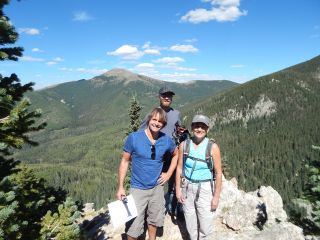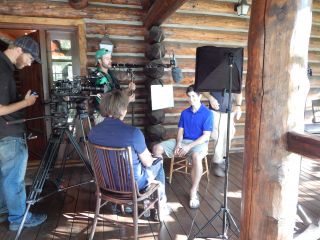Depression
An Unexpected Thanksgiving Story
Mental Health Channel releases a mother/son conversation about her depression
Posted November 23, 2014
“How many people know your story?” he asked. Camera in my face, I did some quick math, never my strength. Books, radio and TV interviews, blogs, hundreds of talks.
“No idea,” I murmured as I summed things up. “Maybe fifty thousand?”
Creative director Scott Rice, a Rhett Miller lookalike with blue eyes that unpeel and comfort in the same instant, rapid-fired his next question. “How many people know your story better than your son?”

Raven's Ridge, Scott Rice, me, drone expert
Ouch. For all my advocacy about mental health, my story about clinical depression and suicide attempts has been left at arms length from my two children. They were five and seven years old when my story unfolded in 2001, the darkest point of my life that is often now my first impression with others. We talk openly about depression in our house, the genetic propensity and the common-sense tools to battle disease. My kids are so open about this information they’ve outed me in essays, college applications, student newspapers and health class. Depression is so often discussed, they don’t know to be embarrassed. But the personal questions, the “why” and “how could you” have been left unsaid.
Neither of my children have read my book, and I’ve not encouraged them to do so. It’s one thing to know that depression is a disease, another to read in detail how your mother felt when she almost killed herself. At age 14, Daniel stole a peek at the first chapter of my unfinished manuscript on my computer long before publication. That was enough for him. He found it disturbing.

My son Daniel, interviewed by Scott Rice
Jeff Fraley, from the Mental Health Channel (MHC), called about a week before filming bubbling with a new idea for a take on my story. MHC promotes mental health by telling stories through eight-minute documentaries online. Jeff and I got whipped into a creative frenzy and decided my story would be best told hiking the trail to the cliff of my second suicide attempt. Daniel, my now 20 year-old son, wanted to participate because being a sophomore at Northwestern’s Medill School of Journalism, he’s got an interest in storytelling on paper and in film, especially if involves drones. Jeff’s idea leveraged Daniel’s presence. “We want you to tell Daniel your story as you hike to the cliff.”
I hesitated. Daniel was all in, with a 20 year-old’s invincible nonchalance. His biggest worry was he wanted to get back in time to catch his flight to see his girlfriend. Being older and more cynical, I knew this project had the potential to go wrong. Would he get hurt? Would the episode smack of reality TV? How deep will my wrinkles look? My brain concocted a whole series of possible disasters.

The Mental Health Channel crew readies for the hike
The film released this week and I got an unexpected gift. There’s a moment in this film that every parent longs for – that unscripted moment when you realize your unconditional love for your child has reflected back. Parenthood is a grab bag of experience with unreliable instructions. As millions gather around Thanksgiving tables this week, we have full evidence of relationship fallout -- people doing the best they can with a task bigger than anyone could do perfectly. At Thanksgiving, expectations are sky high and dysfunction often accompanies the turkey. I’ve had plenty of Thanksgivings like this, and no doubt have more in store.
Every once in awhile, however, we share a story with a family member that contains the risk of rejection and are blessed with a surprising response. Stories can heal. Stories create intimacy and a bond that supports us in the necessary mess that we call life. If we’re lucky, stories create a mirror. This mirror allows us to see ourselves more clearly and dispel the clutter of our preconceptions.
This Thanksgiving, I’ll be savoring my moment on the mountaintop with my son through the inevitable irks and quirks that surround the bird and family gatherings. I am lucky to be here and know it, the one unforeseen benefit of a life-threatening disease. My search for the end of life revealed a beginning of a life I never imagined. For that, I will always be grateful.
Here is the link to this story on the Mental Health Channel.
If you are curious to see some of Daniel’s work with DJD Productions, check out their view of Dallas.
For the “common-sense” tools, check out the Top Ten lists on the Struck by Living website. This lists are also in Spanish on the Decidí Vivir website.
For more information on Julie K Hersh, Struck by Living or Decidí Vivir, check out our newly renovated, bilingual website.




